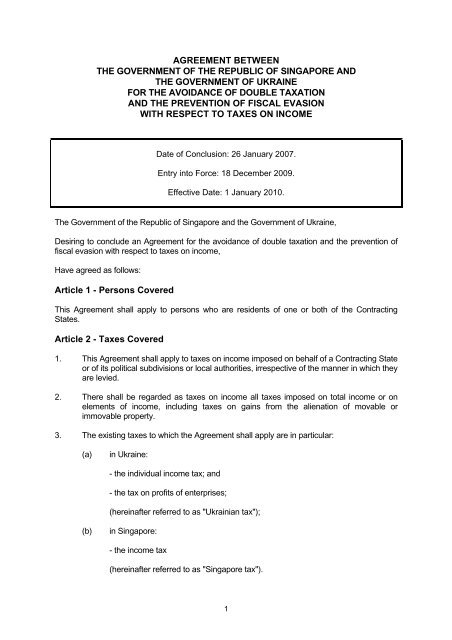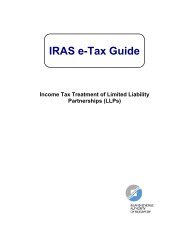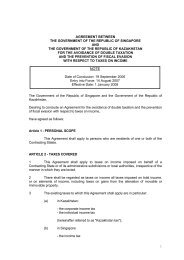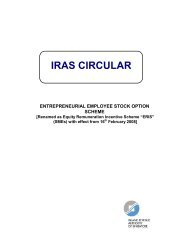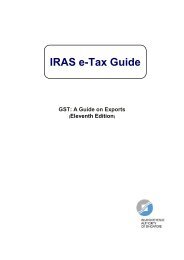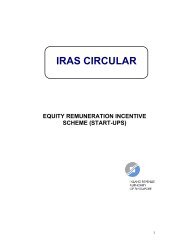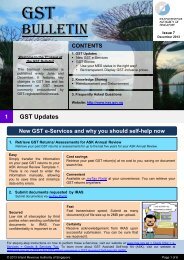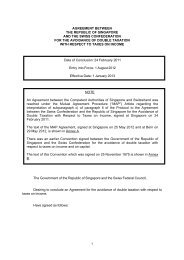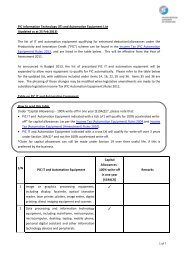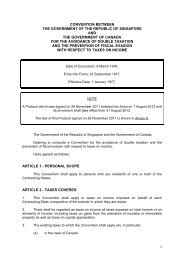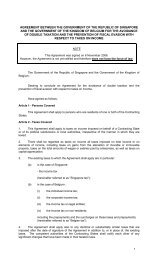Ukraine - IRAS
Ukraine - IRAS
Ukraine - IRAS
Create successful ePaper yourself
Turn your PDF publications into a flip-book with our unique Google optimized e-Paper software.
AGREEMENT BETWEEN<br />
THE GOVERNMENT OF THE REPUBLIC OF SINGAPORE AND<br />
THE GOVERNMENT OF UKRAINE<br />
FOR THE AVOIDANCE OF DOUBLE TAXATION<br />
AND THE PREVENTION OF FISCAL EVASION<br />
WITH RESPECT TO TAXES ON INCOME<br />
Date of Conclusion: 26 January 2007.<br />
Entry into Force: 18 December 2009.<br />
Effective Date: 1 January 2010.<br />
The Government of the Republic of Singapore and the Government of <strong>Ukraine</strong>,<br />
Desiring to conclude an Agreement for the avoidance of double taxation and the prevention of<br />
fiscal evasion with respect to taxes on income,<br />
Have agreed as follows:<br />
Article 1 - Persons Covered<br />
This Agreement shall apply to persons who are residents of one or both of the Contracting<br />
States.<br />
Article 2 - Taxes Covered<br />
1. This Agreement shall apply to taxes on income imposed on behalf of a Contracting State<br />
or of its political subdivisions or local authorities, irrespective of the manner in which they<br />
are levied.<br />
2. There shall be regarded as taxes on income all taxes imposed on total income or on<br />
elements of income, including taxes on gains from the alienation of movable or<br />
immovable property.<br />
3. The existing taxes to which the Agreement shall apply are in particular:<br />
(a)<br />
in <strong>Ukraine</strong>:<br />
- the individual income tax; and<br />
- the tax on profits of enterprises;<br />
(hereinafter referred to as "Ukrainian tax");<br />
(b)<br />
in Singapore:<br />
- the income tax<br />
(hereinafter referred to as "Singapore tax").<br />
1
4. The Agreement shall apply also to any identical or substantially similar taxes which are<br />
imposed after the date of signature of the Agreement in addition to, or in place of, the<br />
existing taxes. The competent authorities of the Contracting States shall notify each<br />
other of any significant changes which have been made in their taxation laws.<br />
Article 3 - General Definitions<br />
1. For the purposes of this Agreement, unless the context otherwise requires:<br />
(a)<br />
(b)<br />
(c)<br />
(d)<br />
(e)<br />
(f)<br />
(g)<br />
(h)<br />
the term "<strong>Ukraine</strong>" when used in a geographical sense, means the territory of<br />
<strong>Ukraine</strong>, its continental shelf and its exclusive (maritime) economic zone,<br />
including any area outside the territorial sea of <strong>Ukraine</strong> which in accordance<br />
with international law has been or may hereafter be designated, as an area<br />
within which the rights of <strong>Ukraine</strong> with respect to the sea-bed and sub-soil and<br />
their natural resources may be exercised;<br />
the term "Singapore" means the Republic of Singapore and when used in a<br />
geographical sense, the term “Singapore” includes the territorial waters of<br />
Singapore and any area extending beyond the limits of the territorial waters of<br />
Singapore, and the sea-bed and subsoil of any such area, which has been or<br />
may hereafter be designated under the laws of Singapore and in accordance<br />
with international law as an area over which Singapore has sovereign rights for<br />
the purposes of exploring and exploiting the natural resources, whether living or<br />
non-living;<br />
the term "Contracting State" means <strong>Ukraine</strong> or Singapore as the context<br />
requires;<br />
the term "person" includes an individual, a company and any other body of<br />
persons;<br />
the term "company" means any body corporate or any entity that is treated as a<br />
body corporate for tax purposes;<br />
the terms "enterprise of a Contracting State" and "enterprise of the other<br />
Contracting State" mean respectively an enterprise carried on by a resident of a<br />
Contracting State and an enterprise carried on by a resident of the other<br />
Contracting State;<br />
the term "international traffic" means any transport by a ship or aircraft operated<br />
by an enterprise of a Contracting State, except when the ship or aircraft is<br />
operated solely between places in the other Contracting State;<br />
the term "competent authority" means:<br />
(i)<br />
(ii)<br />
in <strong>Ukraine</strong>, the Ministry of Finance of <strong>Ukraine</strong> or its authorised<br />
representative, and<br />
in Singapore, the Minister for Finance or his authorised representative;<br />
(i)<br />
the term "national", in relation to a Contracting State, means:<br />
(i)<br />
any individual possessing the nationality or citizenship of that Contracting<br />
State;<br />
2
(ii)<br />
any legal person, partnership or association deriving its status as such<br />
from the laws in force in a Contracting State.<br />
2. As regards the application of the Agreement at any time by a Contracting State, any<br />
term not defined therein shall, unless the context otherwise requires, have the meaning<br />
that it has at that time under the law of that State for the purposes of the taxes to which<br />
the Agreement applies, any meaning under the applicable tax laws of that State<br />
prevailing over a meaning given to the term under other laws of that State.<br />
Article 4 - Resident<br />
1. For the purposes of this Agreement, the term "resident of a Contracting State" means<br />
any person who, under the laws of that State, is liable to tax therein by reason of his<br />
domicile, residence, place of management, place of incorporation or any other criterion<br />
of a similar nature, and also includes that State and any political subdivision, local<br />
authority or statutory body thereof.<br />
2. Where by reason of the provisions of paragraph 1 an individual is a resident of both<br />
Contracting States, then his status shall be determined as follows:<br />
(a)<br />
(b)<br />
(c)<br />
(d)<br />
he shall be deemed to be a resident only of the Contracting State in which he<br />
has a permanent home available to him; if he has a permanent home available<br />
to him in both Contracting States, he shall be deemed to be a resident only of<br />
the Contracting State with which his personal and economic relations are closer<br />
(centre of vital interests);<br />
if the Contracting State in which he has his centre of vital interests cannot be<br />
determined, or if he has not a permanent home available to him in either<br />
Contracting State, he shall be deemed to be a resident only of the Contracting<br />
State in which he has an habitual abode;<br />
if he has an habitual abode in both Contracting States or in neither of them, he<br />
shall be deemed to be a resident only of the Contracting State of which he is a<br />
national;<br />
in any other case, the competent authorities of the Contracting States shall settle<br />
the question by mutual agreement.<br />
3. Where by reason of the provisions of paragraph 1 a person other than an individual is<br />
a resident of both Contracting States, the competent authorities of the Contracting<br />
States shall endeavour to settle the question by mutual agreement and determine the<br />
mode of application of the Agreement to such person. In the absence of such<br />
agreement, such person shall not be considered to be a resident of either<br />
Contracting State for purposes of enjoying benefits under the Agreement.<br />
Article 5 - Permanent Establishment<br />
1. For the purposes of this Agreement, the term "permanent establishment" means a fixed<br />
place of business through which the business of an enterprise is wholly or partly carried<br />
on.<br />
2. The term "permanent establishment" includes especially:<br />
(a)<br />
a place of management;<br />
3
(b)<br />
(c)<br />
(d)<br />
(e)<br />
(f)<br />
(g)<br />
a branch;<br />
an office;<br />
a factory;<br />
a workshop;<br />
a mine, an oil or gas well, a quarry or any other place of extraction of natural<br />
resources; and<br />
a warehouse or other structure used as a sales outlet.<br />
3. The term "permanent establishment" also encompasses:<br />
(a)<br />
(b)<br />
a building site, a construction, assembly or installation project or supervisory<br />
activities in connection therewith, but only if such site, project or activities last<br />
more than twelve months;<br />
the furnishing of services, including consultancy services, by an enterprise<br />
through employees or other personnel engaged by the enterprise for such<br />
purpose, but only if activities of that nature continue (for the same or a<br />
connected project) within a Contracting State for a period or periods<br />
aggregating more than six months within any twelve-month period.<br />
4. Notwithstanding the preceding provisions of this Article, the term "permanent<br />
establishment" shall be deemed not to include:<br />
(a)<br />
(b)<br />
(c)<br />
(d)<br />
(e)<br />
(f)<br />
the use of facilities solely for the purpose of storage, display or delivery of goods<br />
or merchandise belonging to the enterprise;<br />
the maintenance of a stock of goods or merchandise belonging to the enterprise<br />
solely for the purpose of storage, display or delivery;<br />
the maintenance of a stock of goods or merchandise belonging to the enterprise<br />
solely for the purpose of processing by another enterprise;<br />
the maintenance of a fixed place of business solely for the purpose of<br />
purchasing goods or merchandise or of collecting information, for the enterprise;<br />
the maintenance of a fixed place of business solely for the purpose of carrying<br />
on, for the enterprise, any other activity of a preparatory or auxiliary character;<br />
the maintenance of a fixed place of business solely for any combination of<br />
activities mentioned in sub-paragraphs (a) to (e), provided that the overall activity<br />
of the fixed place of business resulting from this combination is of a preparatory<br />
or auxiliary character.<br />
5. Notwithstanding the provisions of paragraphs 1 and 2, where a person - other than<br />
an agent of an independent status to whom paragraph 6 applies - is acting on behalf<br />
of an enterprise and has, and habitually exercises, in a Contracting State an authority<br />
to conclude contracts in the name of the enterprise, that enterprise shall be deemed<br />
to have a permanent establishment in that State in respect of any activities which that<br />
person undertakes for the enterprise, unless the activities of such person are limited<br />
to those mentioned in paragraph 4 which, if exercised through a fixed place of<br />
4
usiness, would not make this fixed place of business a permanent establishment<br />
under the provisions of that paragraph.<br />
6. An enterprise of a Contracting State shall not be deemed to have a permanent<br />
establishment in the other Contracting State merely because it carries on business in<br />
that other State through a broker, general commission agent or any other agent of an<br />
independent status, provided that such persons are acting in the ordinary course of their<br />
business. However, when the activities of such an agent are devoted wholly or almost<br />
wholly on behalf of that enterprise, and conditions are made or imposed between that<br />
enterprise and the agent in their commercial and financial relations which differ from<br />
those which would have been made between independent enterprises, he will not be<br />
considered an agent of an independent status within the meaning of this paragraph.<br />
7. The fact that a company which is a resident of a Contracting State controls or is<br />
controlled by a company which is a resident of the other Contracting State, or which<br />
carries on business in that other State (whether through a permanent establishment or<br />
otherwise), shall not of itself constitute either company a permanent establishment of the<br />
other.<br />
Article 6 - Income from Immovable Property<br />
1. Income derived by a resident of a Contracting State from immovable property (including<br />
income from agriculture or forestry) situated in the other Contracting State may be taxed<br />
in that other State.<br />
2. The term "immovable property" shall have the meaning which it has under the laws of<br />
the Contracting State in which the property in question is situated. The term shall in any<br />
case include property accessory to immovable property, livestock and equipment used<br />
in agriculture and forestry, rights to which the provisions of general law respecting<br />
landed property apply, usufruct of immovable property and rights to variable or fixed<br />
payments as consideration for the working of, or the right to work, mineral deposits,<br />
sources and other natural resources; ships and aircraft shall not be regarded as<br />
immovable property.<br />
3. The provisions of paragraph 1 shall apply to income derived from the direct use, letting,<br />
or use in any other form of immovable property.<br />
4. The provisions of paragraphs 1 and 3 shall also apply to the income from immovable<br />
property of an enterprise and to income from immovable property used for the<br />
performance of independent personal services.<br />
Article 7 - Business Profits<br />
1. The profits of an enterprise of a Contracting State shall be taxable only in that State<br />
unless the enterprise carries on business in the other Contracting State through a<br />
permanent establishment situated therein. If the enterprise carries on business as<br />
aforesaid, the profits of the enterprise may be taxed in the other State but only so much<br />
of them as is attributable to that permanent establishment.<br />
2. Subject to the provisions of paragraph 3, where an enterprise of a Contracting State<br />
carries on business in the other Contracting State through a permanent establishment<br />
situated therein, there shall in each Contracting State be attributed to that permanent<br />
establishment the profits which it might be expected to make if it were a distinct and<br />
separate enterprise engaged in the same or similar activities under the same or similar<br />
5
conditions and dealing wholly independently with the enterprise of which it is a<br />
permanent establishment.<br />
3. In determining the profits of a permanent establishment, there shall be allowed as<br />
deductions all expenses, including executive and general administrative expenses,<br />
which would be deductible if the permanent establishment were an independent<br />
enterprise, insofar as they are reasonably allocable to the permanent establishment,<br />
whether incurred in the Contracting State in which the permanent establishment is<br />
situated or elsewhere. However, no such deduction shall be allowed in respect of<br />
amounts, if any, paid (otherwise than towards reimbursement of actual expenses) by<br />
the permanent establishment to the head office of the enterprise or any of its other<br />
offices, by way of royalties, fees or other similar payments in return for the use of<br />
patents or other rights, or by way of commission, for specific services performed or<br />
for management, or, except in case of a banking enterprise, by way of interest on<br />
moneys lent to the permanent establishment. Likewise, no account shall be taken, in<br />
the determination of the profits of a permanent establishment, for amounts charged<br />
(otherwise than towards reimbursement of actual expenses), by the permanent<br />
establishment to the head office of the enterprise or any of its other offices, by way of<br />
royalties, fees or other similar payments in return for the use of patents or other<br />
rights, or by way of commission for specific services performed or for management,<br />
or, except in the case of a banking enterprise, by way of interest on moneys lent to<br />
the head office of the enterprise or any of its other offices.<br />
4. Insofar as it has been customary in a Contracting State to determine the profits to be<br />
attributed to a permanent establishment on the basis of an apportionment of the total<br />
profits of the enterprise to its various parts, nothing in paragraph 2 shall preclude that<br />
Contracting State from determining the profits to be taxed by such an apportionment<br />
as may be customary; the method of apportionment adopted shall, however, be such<br />
that the result shall be in accordance with the principles contained in this Article.<br />
5. No profits shall be attributed to a permanent establishment by reason of the mere<br />
purchase by that permanent establishment of goods or merchandise for the enterprise.<br />
6. For the purposes of the preceding paragraphs, the profits to be attributed to the<br />
permanent establishment shall be determined by the same method year by year unless<br />
there is good and sufficient reason to the contrary.<br />
7. Where profits include items of income which are dealt with separately in other Articles of<br />
this Agreement, then the provisions of those Articles shall not be affected by the<br />
provisions of this Article.<br />
Article 8 - Shipping and Air Transport<br />
1. Profits derived by an enterprise of a Contracting State from the operation of ships or<br />
aircraft in international traffic shall be taxable only in that State.<br />
2. For the purposes of this Article, profits from the operation of ships or aircraft in<br />
international traffic shall include:<br />
(a)<br />
(b)<br />
profits from the rental on a bareboat basis of ships or aircraft; and<br />
profits from the use, maintenance or rental of containers (including trailers and<br />
related equipment for the transport of containers), used for the transport of<br />
goods or merchandise;<br />
6
where such rental or such use, maintenance or rental, as the case may be, is incidental<br />
to the operation of ships or aircraft in international traffic.<br />
3. The provisions of paragraph 1 shall also apply to profits from the participation in a pool,<br />
a joint business or an international operating agency.<br />
Article 9 - Associated Enterprises<br />
1. Where<br />
(a)<br />
(b)<br />
an enterprise of a Contracting State participates directly or indirectly in the<br />
management, control or capital of an enterprise of the other Contracting State, or<br />
the same persons participate directly or indirectly in the management, control or<br />
capital of an enterprise of a Contracting State and an enterprise of the other<br />
Contracting State,<br />
and in either case conditions are made or imposed between the two enterprises in their<br />
commercial or financial relations which differ from those which would be made between<br />
independent enterprises, then any profits which would, but for those conditions, have<br />
accrued to one of the enterprises, but, by reason of those conditions, have not so<br />
accrued, may be included in the profits of that enterprise and taxed accordingly.<br />
2. Where a Contracting State includes in the profits of an enterprise of that State - and<br />
taxes accordingly - profits on which an enterprise of the other Contracting State has<br />
been charged to tax in that other State and the profits so included are profits which<br />
would have accrued to the enterprise of the first-mentioned State if the conditions<br />
made between the two enterprises had been those which would have been made<br />
between independent enterprises, then that other State shall make an appropriate<br />
adjustment to the amount of the tax charged therein on those profits where that other<br />
State considers the adjustment justified. In determining such adjustment, due regard<br />
shall be had to the other provisions of the Agreement and the competent authorities<br />
of the Contracting States shall, if necessary, consult each other.<br />
Article 10 - Dividends<br />
1. Dividends paid by a company which is a resident of a Contracting State to a resident of<br />
the other Contracting State may be taxed in that other State.<br />
2. However, such dividends may also be taxed in the Contracting State of which the<br />
company paying the dividends is a resident and according to the laws of that State, but if<br />
the beneficial owner of the dividends is a resident of the other Contracting State, the tax<br />
so charged shall not exceed:<br />
(a)<br />
(b)<br />
5 per cent of the gross amount of the dividends if the beneficial owner is a<br />
company (other than a partnership) which holds directly at least 20 per cent of<br />
the capital of the company paying the dividends;<br />
15 per cent of the gross amount of the dividends in all other cases.<br />
The competent authorities of the Contracting States shall by mutual agreement settle<br />
the mode of application of these limitations.<br />
This paragraph shall not affect the taxation of the company in respect of the profits out of<br />
which the dividends are paid.<br />
7
3. Notwithstanding the provisions of paragraphs 1 and 2, dividends paid by a company<br />
which is a resident of a Contracting State shall be taxable only in the other Contracting<br />
State if the beneficial owner of the dividends is the Government of that other State, or<br />
the Central Bank thereof, or any other government institution thereof or statutory body<br />
as may be agreed from time to time between the competent authorities of the<br />
Contracting States.<br />
4. The term "dividends" as used in this Article means income from shares, or other rights,<br />
not being debt-claims, participating in profits, as well as income from other corporate<br />
rights which is subjected to the same taxation treatment as income from shares by the<br />
laws of the State of which the company making the distribution is a resident.<br />
5. The provisions of paragraphs 1 and 2 shall not apply if the beneficial owner of the<br />
dividends, being a resident of a Contracting State, carries on business in the other<br />
Contracting State of which the company paying the dividends is a resident, through a<br />
permanent establishment situated therein, or performs in that other State independent<br />
personal services from a fixed base situated therein, and the holding in respect of which<br />
the dividends are paid is effectively connected with such permanent establishment or<br />
fixed base. In such case the provisions of Article 7 or Article 14, as the case may be,<br />
shall apply.<br />
6. Where a company which is a resident of a Contracting State derives profits or income<br />
from the other Contracting State, that other State may not impose any tax on the<br />
dividends paid by the company, except insofar as such dividends are paid to a resident<br />
of that other State or insofar as the holding in respect of which the dividends are paid is<br />
effectively connected with a permanent establishment or a fixed base situated in that<br />
other State, nor subject the company's undistributed profits to a tax on undistributed<br />
profits, even if the dividends paid or the undistributed profits consist wholly or partly of<br />
profits or income arising in such other State.<br />
Article 11 - Interest<br />
1. Interest arising in a Contracting State and paid to a resident of the other Contracting<br />
State may be taxed in that other State.<br />
2. However, such interest may also be taxed in the Contracting State in which it arises and<br />
according to the laws of that State, but if the beneficial owner of the interest is a resident<br />
of the other Contracting State, the tax so charged shall not exceed 10 per cent of the<br />
gross amount of the interest.<br />
The competent authorities of the Contracting States shall by mutual agreement settle the<br />
mode of application of this limitation.<br />
3. Notwithstanding the provisions of paragraphs 1 and 2, interest paid by a company which<br />
is a resident of a Contracting State shall be taxable only in the other Contracting State if<br />
the beneficial owner of the interest is the Government of that other State, or the Central<br />
Bank thereof, or any other government institution thereof or statutory body as may be<br />
agreed from time to time between the competent authorities of the Contracting States.<br />
4. The term "interest" as used in this Article means income from debt-claims of every kind,<br />
whether or not secured by mortgage and whether or not carrying a right to participate in<br />
the debtor's profits, and in particular, income from government securities and income<br />
from bonds or debentures, including premiums and prizes attaching to such securities,<br />
8
onds or debentures. Penalty charges for late payment shall not be regarded as<br />
interest for the purpose of this Article.<br />
5. The provisions of paragraphs 1 and 2 shall not apply if the beneficial owner of the<br />
interest, being a resident of a Contracting State, carries on business in the other<br />
Contracting State in which the interest arises, through a permanent establishment<br />
situated therein, or performs in that other State independent personal services from a<br />
fixed base situated therein, and the debt-claim in respect of which the interest is paid is<br />
effectively connected with such permanent establishment or fixed base. In such case<br />
the provisions of Article 7 or Article 14, as the case may be, shall apply.<br />
6. Interest shall be deemed to arise in a Contracting State when the payer is a resident of<br />
that State. Where, however, the person paying the interest, whether he is a resident of a<br />
Contracting State or not, has in a Contracting State a permanent establishment or a<br />
fixed base in connection with which the indebtedness on which the interest is paid was<br />
incurred, and such interest is borne by such permanent establishment or fixed base,<br />
then such interest shall be deemed to arise in the State in which the permanent<br />
establishment or fixed base is situated.<br />
7. Where, by reason of a special relationship between the payer and the beneficial owner<br />
or between both of them and some other person, the amount of the interest, having<br />
regard to the debt-claim for which it is paid, exceeds the amount which would have been<br />
agreed upon by the payer and the beneficial owner in the absence of such relationship,<br />
the provisions of this Article shall apply only to the last-mentioned amount. In such case,<br />
the excess part of the payments shall remain taxable according to the laws of each<br />
Contracting State, due regard being had to the other provisions of this Agreement.<br />
8. The provisions of this Article shall not apply if it was the main purpose or one of the<br />
main purposes of any person concerned with the creation or assignment of the debtclaim<br />
in respect of which the interest is paid to take advantage of this Article by means<br />
of that creation or assignment.<br />
Article 12 - Royalties<br />
1. Royalties arising in a Contracting State and paid to a resident of the other Contracting<br />
State may be taxed in that other State.<br />
2. However, such royalties may also be taxed in the Contracting State in which they arise<br />
and according to the laws of that State, but if the beneficial owner of the royalties is a<br />
resident of the other Contracting State, the tax so charged shall not exceed 7.5 per cent<br />
of the gross amount of the royalties.<br />
The competent authorities of the Contracting States shall by mutual agreement settle<br />
the mode of application of this limitation.<br />
3. The term "royalties" as used in this Article means payments of any kind received as a<br />
consideration for the use of, or the right to use, any copyright of literary, artistic or<br />
scientific work including cinematograph films, and films or tapes for radio or television<br />
broadcasting, any computer software, patent, trade mark, design or model, plan, secret<br />
formula or process, or for the use of, or right to use, industrial, commercial or scientific<br />
equipment, or for information concerning industrial, commercial or scientific experience.<br />
4. The provisions of paragraphs 1 and 2 shall not apply if the beneficial owner of the<br />
royalties, being a resident of a Contracting State, carries on business in the other<br />
Contracting State in which the royalties arise, through a permanent establishment<br />
9
situated therein, or performs in that other State independent personal services from a<br />
fixed base situated therein, and the right or property in respect of which the royalties are<br />
paid is effectively connected with such permanent establishment or fixed base. In such<br />
case the provisions of Article 7 or Article 14, as the case may be, shall apply.<br />
5. Royalties shall be deemed to arise in a Contracting State when the payer is a resident of<br />
that State. Where, however, the person paying the royalties, whether he is a resident of<br />
a Contracting State or not, has in a Contracting State a permanent establishment or a<br />
fixed base in connection with which the liability to pay the royalties was incurred, and<br />
such royalties are borne by such permanent establishment or fixed base, then such<br />
royalties shall be deemed to arise in the Contracting State in which the permanent<br />
establishment or fixed base is situated.<br />
6. Where, by reason of a special relationship between the payer and the beneficial owner<br />
or between both of them and some other person, the amount of the royalties, having<br />
regard to the use, right or information for which they are paid, exceeds the amount which<br />
would have been agreed upon by the payer and the beneficial owner in the absence of<br />
such relationship, the provisions of this Article shall apply only to the last-mentioned<br />
amount. In such case, the excess part of the payments shall remain taxable according<br />
to the laws of each Contracting State, due regard being had to the other provisions of<br />
this Agreement.<br />
7. The provisions of this Article shall not apply if it was the main purpose or one of the main<br />
purposes of any person concerned with the creation or assignment of the rights in<br />
respect of which the royalties are paid to take advantage of this Article by means of that<br />
creation or assignment.<br />
Article 13 - Capital Gains<br />
1. Gains derived by a resident of a Contracting State from the alienation of immovable<br />
property referred to in Article 6 and situated in the other Contracting State may be taxed<br />
in that other State.<br />
2. Gains derived by a resident of a Contracting State from the alienation of:<br />
(a)<br />
(b)<br />
shares, other than shares traded on a recognised Stock Exchange, deriving<br />
at least three-quarters of their value directly or indirectly from immovable<br />
property situated in the other Contracting State, or<br />
an interest in a partnership the assets of which derive at least three-quarters<br />
of their value directly or indirectly from immovable property situated in the<br />
other Contracting State,<br />
may be taxed in that other State.<br />
For the purposes of sub-paragraph (b) of this paragraph, assets consisting of shares<br />
referred to in sub-paragraph (a) of this paragraph shall be regarded as immovable<br />
property.<br />
3. Gains from the alienation of movable property forming part of the business property of a<br />
permanent establishment which an enterprise of a Contracting State has in the other<br />
Contracting State or of movable property pertaining to a fixed base available to a<br />
resident of a Contracting State in the other Contracting State for the purpose of<br />
performing independent personal services, including such gains from the alienation of<br />
10
such a permanent establishment (alone or with the whole enterprise) or of such fixed<br />
base, may be taxed in that other State.<br />
4. Gains derived by an enterprise of a Contracting State from the alienation of ships or<br />
aircraft operated in international traffic, or movable property pertaining to the operation of<br />
such ships or aircraft, shall be taxable only in that State.<br />
5. Gains from the alienation of any property other than that referred to in paragraphs 1, 2, 3<br />
and 4 shall be taxable only in the Contracting State of which the alienator is a resident.<br />
Article 14 - Independent Personal Services<br />
1. Income derived by an individual who is a resident of a Contracting State from the<br />
performance of professional services or other activities of an independent character<br />
shall be taxable only in that State except in the following circumstances when such<br />
income may also be taxed in the other Contracting State:<br />
(a)<br />
(b)<br />
if he has a fixed base regularly available to him in the other Contracting State<br />
for the purpose of performing his activities; in that case, only so much of the<br />
income as is attributable to that fixed base may be taxed in that other<br />
Contracting State; or<br />
if his stay in the other Contracting State is for a period or periods exceeding in<br />
the aggregate 183 days in any twelve-month period commencing or ending in<br />
the calendar year concerned; in that case, only so much of the income as is<br />
derived from his activities performed in that other State may be taxed in that<br />
other State.<br />
2. The term "professional services" includes especially independent scientific, literary,<br />
artistic, educational or teaching activities as well as the independent activities of<br />
physicians, lawyers, engineers, architects, dentists and accountants.<br />
Article 15 - Dependent Personal Services<br />
1. Subject to the provisions of Articles 16, 18 and 19, salaries, wages and other similar<br />
remuneration derived by a resident of a Contracting State in respect of an employment<br />
shall be taxable only in that State unless the employment is exercised in the other<br />
Contracting State. If the employment is so exercised, such remuneration as is derived<br />
therefrom may be taxed in that other State.<br />
2. Notwithstanding the provisions of paragraph 1, remuneration derived by a resident of a<br />
Contracting State in respect of an employment exercised in the other Contracting State<br />
shall be taxable only in the first-mentioned State if:<br />
(a)<br />
(b)<br />
(c)<br />
the recipient is present in the other State for a period or periods not exceeding in<br />
the aggregate 183 days in any twelve month period commencing or ending in<br />
the calendar year concerned; and<br />
the remuneration is paid by, or on behalf of, an employer who is not a resident of<br />
the other State; and<br />
the remuneration is not borne by a permanent establishment or a fixed base<br />
which the employer has in the other State.<br />
11
3. Notwithstanding the preceding provisions of this Article, remuneration derived in<br />
respect of an employment exercised aboard a ship or aircraft operated in<br />
international traffic may be taxed in the Contracting State of which the enterprise<br />
operating the ship or aircraft is a resident.<br />
Article 16 - Directors' Fees<br />
Directors' fees and other similar payments derived by a resident of a Contracting State in his<br />
capacity as a member of the board of directors of a company which is a resident of the other<br />
Contracting State may be taxed in that other State.<br />
Article 17 - Artistes and Sportsmen<br />
1. Notwithstanding the provisions of Articles 14 and 15, income derived by a resident of a<br />
Contracting State as an entertainer, such as a theatre, motion picture, radio or television<br />
artiste, or a musician, or as a sportsman, from his personal activities as such exercised<br />
in the other Contracting State, may be taxed in that other State.<br />
2. Where income in respect of or in connection with personal activities exercised by an<br />
entertainer or a sportsman accrues not to the entertainer or sportsman himself but to<br />
another person, that income may, notwithstanding the provisions of Articles 7, 14 and<br />
15, be taxed in the Contracting State in which the activities of the entertainer or<br />
sportsman are exercised.<br />
3. The provisions of paragraphs 1 and 2 shall not apply to income derived from<br />
activities exercised in a Contracting State by an artiste or a sportsman if the visit to<br />
that State is wholly or mainly supported by public funds of one or both of the<br />
Contracting States or political subdivisions or local authorities or statutory bodies<br />
thereof. In such case, the income shall be taxable only in the Contracting State in<br />
which the artiste or the sportsman is a resident.<br />
Article 18 - Pensions<br />
1. Subject to the provisions of paragraph 2 of Article 19, pensions and other similar<br />
remuneration paid to a resident of a Contracting State in consideration of past<br />
employment shall be taxable only in that State.<br />
2. Notwithstanding the provisions of paragraph 1, pensions and other similar<br />
remuneration paid under State Pension Plan as a part of social security system of a<br />
Contracting State, its political subdivision or local authority, shall be taxed only in that<br />
State.<br />
Article 19 - Government Service<br />
1. (a) Salaries, wages and other similar remuneration, other than a pension, paid by a<br />
Contracting State or a political subdivision, a local authority or a statutory body thereof to an<br />
individual in respect of services rendered to that State or subdivision or authority or body shall<br />
be taxable only in that State.<br />
(b) However, such salaries, wages and other similar remuneration shall be taxable only in<br />
the other Contracting State if the services are rendered in that State and the individual is a<br />
resident of that State who:<br />
(i)<br />
is a national of that State; or<br />
12
(ii)<br />
did not become a resident of that State solely for the purpose of rendering the<br />
services.<br />
2. (a) Any pension paid by, or out of funds created by, a Contracting State or a political<br />
subdivision, a local authority or a statutory body thereof to an individual in respect of services<br />
rendered to that State or subdivision, authority or body shall be taxable only in that State.<br />
(b) However, such pension shall be taxable only in the other Contracting State if the<br />
individual is a resident of, and a national of, that State.<br />
3. The provisions of Articles 15, 16 and 18 shall apply to salaries, wages and other similar<br />
remuneration, and to pensions, in respect of services rendered in connection with a<br />
business carried on by a Contracting State or a political subdivision or a local authority<br />
or a statutory body thereof.<br />
Article 20 - Students<br />
Payments which a student or business trainee or apprentice who is or was immediately before<br />
visiting a Contracting State a resident of the other Contracting State and who is present in the<br />
first-mentioned State solely for the purpose of his education or training receives for the purpose<br />
of his maintenance, education or training shall not be taxed in that State, provided that such<br />
payments arise from sources outside that State.<br />
Article 21 - Other Income<br />
1. Items of income of a resident of a Contracting State, wherever arising, not dealt with in<br />
the foregoing Articles of this Agreement, shall be taxable only in that State.<br />
2. The provisions of paragraph 1 shall not apply to income, other than income from<br />
immovable property as defined in paragraph 2 of Article 6, if the recipient of such<br />
income, being a resident of a Contracting State, carries on business in the other<br />
Contracting State through a permanent establishment situated therein, or performs in<br />
that other State independent personal services from a fixed base situated therein, and the<br />
right or property in respect of which the income is paid is effectively connected with<br />
such permanent establishment or fixed base. In such case the provisions of Article 7 or<br />
Article 14, as the case may be, shall apply.<br />
3. Notwithstanding the provisions of paragraphs 1 and 2, items of income of a resident<br />
of a Contracting State not dealt with in the foregoing articles of this Agreement and<br />
arising in the other Contracting State may also be taxed in that other State.<br />
Article 22 - Elimination of Double Taxation<br />
1. In <strong>Ukraine</strong>, double taxation shall be avoided as follows:<br />
Where a resident of <strong>Ukraine</strong> derives income which, in accordance with the provisions<br />
of this Agreement, may be taxed in Singapore, <strong>Ukraine</strong> shall allow as a deduction<br />
from the tax on the income of that resident, an amount equal to the income tax paid<br />
in Singapore. Such deduction shall not, however, exceed that part of the income tax<br />
as computed before the deduction is given, which is attributable to the income which<br />
may be taxed in <strong>Ukraine</strong>.<br />
Where in accordance with any provision of the Agreement income derived by a<br />
resident of <strong>Ukraine</strong> is exempt from tax in <strong>Ukraine</strong>, <strong>Ukraine</strong> may nevertheless, in<br />
13
calculating the amount of tax on the remaining income of such resident, take into<br />
account the exempted income.<br />
2. In Singapore, double taxation shall be avoided as follows:<br />
Where a resident of Singapore derives income from <strong>Ukraine</strong> which, in accordance with<br />
the provisions of this Agreement, may be taxed in <strong>Ukraine</strong>, Singapore shall, subject to its<br />
laws regarding the allowance as a credit against Singapore tax of tax payable in any<br />
country other than Singapore, allow the Ukrainian tax paid, whether directly or by<br />
deduction, as a credit against the Singapore tax payable on the income of that resident.<br />
Where such income is a dividend paid by a company which is a resident of <strong>Ukraine</strong> to a<br />
resident of Singapore which is a company owning directly or indirectly not less than 10<br />
per cent of the share capital of the first-mentioned company, the credit shall take into<br />
account the Ukrainian tax paid by that company on the portion of its profits out of which<br />
the dividend is paid.<br />
Article 23 - Non-Discrimination<br />
1. Nationals of a Contracting State shall not be subjected in the other Contracting State to<br />
any taxation or any requirement connected therewith, which is other or more<br />
burdensome than the taxation and connected requirements to which nationals of that<br />
other State in the same circumstances, in particular with respect to residence, are or<br />
may be subjected. This provision shall, notwithstanding the provisions of Article 1, also<br />
apply to persons who are not residents of one or both of the Contracting States.<br />
2. The taxation on a permanent establishment which an enterprise of a Contracting State<br />
has in the other Contracting State shall not be less favourably levied in that other State<br />
than the taxation levied on enterprises of that other State carrying on the same activities.<br />
3. Nothing contained in this Article shall be construed as obliging either Contracting<br />
State to grant to persons not resident in that State any of the personal allowances,<br />
reliefs and reductions for tax purposes which are granted to its residents under its tax<br />
laws.<br />
4. Except where the provisions of paragraph 1 of Article 9, paragraph 7 of Article 11, or<br />
paragraph 6 of Article 12, apply, interest, royalties and other disbursements paid by<br />
an enterprise of a Contracting State to a resident of the other Contracting State shall,<br />
for the purpose of determining the taxable profits of such enterprise, be deductible<br />
under the same conditions as if they had been paid to a resident of the firstmentioned<br />
State.<br />
5. Enterprises of a Contracting State, the capital of which is wholly or partly owned or<br />
controlled, directly or indirectly, by one or more residents of the other Contracting State,<br />
shall not be subjected in the first-mentioned State to any taxation or any requirement<br />
connected therewith which is other or more burdensome than the taxation and<br />
connected requirements to which other similar enterprises of the first-mentioned State<br />
are or may be subjected.<br />
6. The provisions of this Article shall apply to the taxes covered by this Agreement.<br />
Article 24 - Mutual Agreement Procedure<br />
1. Where a person considers that the actions of one or both of the Contracting States result<br />
or will result for him in taxation not in accordance with the provisions of this Agreement,<br />
he may, irrespective of the remedies provided by the domestic law of those States,<br />
14
present his case to the competent authority of the Contracting State of which he is a<br />
resident or, if his case comes under paragraph 1 of Article 23, to that of the Contracting<br />
State of which he is a national. The case must be presented within 3 years from the first<br />
notification of the action resulting in taxation not in accordance with the provisions of the<br />
Agreement.<br />
2. The competent authority shall endeavour, if the objection appears to it to be justified and<br />
if it is not itself able to arrive at a satisfactory solution, to resolve the case by mutual<br />
agreement with the competent authority of the other Contracting State, with a view to the<br />
avoidance of taxation which is not in accordance with the Agreement. Any agreement<br />
reached shall be implemented notwithstanding any time limits in the domestic law of the<br />
Contracting States.<br />
3. The competent authorities of the Contracting States shall endeavour to resolve by<br />
mutual agreement any difficulties or doubts arising as to the interpretation or application<br />
of the Agreement. They may also consult together for the elimination of double taxation<br />
in cases not provided for in the Agreement.<br />
4. The competent authorities of the Contracting States may communicate with each other<br />
directly for the purpose of reaching an agreement in the sense of the preceding<br />
paragraphs.<br />
Article 25 - Exchange of Information<br />
1. The competent authorities of the Contracting States shall exchange such information as<br />
is necessary for carrying out the provisions of this Agreement or of the domestic laws of<br />
the Contracting States concerning taxes covered by the Agreement insofar as the<br />
taxation thereunder is not contrary to the Agreement, in particular for the prevention of<br />
fraud or evasion of such taxes. Any information received by a Contracting State shall be<br />
treated as secret in the same manner as information obtained under the domestic laws<br />
of that State, and shall be disclosed only to persons or authorities (including courts and<br />
administrative bodies) concerned with the assessment or collection of, the enforcement<br />
or prosecution in respect of, or the determination of appeals in relation to, the taxes<br />
covered by the Agreement. Such persons or authorities shall use the information only<br />
for such purposes. They may disclose the information in public court proceedings or in<br />
judicial decisions.<br />
2. In no case shall the provisions of paragraph 1 be construed so as to impose on a<br />
Contracting State the obligation:<br />
(a)<br />
(b)<br />
(c)<br />
to carry out administrative measures at variance with the laws and administrative<br />
practice of that or of the other Contracting State;<br />
to supply information which is not obtainable under the laws or in the normal<br />
course of the administration of that or of the other Contracting State;<br />
to supply information which would disclose any trade, business, industrial,<br />
commercial or professional secret or trade process, or information, the<br />
disclosure of which would be contrary to public policy (ordre public).<br />
Article 26 - Members of Diplomatic Missions and Consular Posts<br />
Nothing in this Agreement shall affect the fiscal privileges of members of diplomatic missions or<br />
consular posts under the general rules of international law or under the provisions of special<br />
agreements.<br />
15
Article 27 - Entry into Force<br />
The Contracting States shall notify each other in writing, through the diplomatic channels of<br />
the completion of all the domestic procedures required for the bringing into force of this<br />
Agreement. This Agreement shall enter into force on the date of the later of these written<br />
notifications and shall thereupon have effect:<br />
(a)<br />
in <strong>Ukraine</strong>:<br />
(i)<br />
(ii)<br />
in respect of taxes withheld at source on or after the first day of<br />
January in the year following that in which the Agreement enters into<br />
force; and<br />
in respect of other taxes for the taxable year beginning on or after the<br />
first day of January in the year following that in which the Agreement<br />
enters into force.<br />
(b)<br />
in Singapore:<br />
Article 28 - Termination<br />
in respect of tax chargeable for any year of assessment beginning on or after<br />
1 January in the second calendar year following the year in which the<br />
Agreement enters into force.<br />
This Agreement shall remain in force indefinitely. Either Contracting State may terminate the<br />
Agreement, through diplomatic channels, by giving written notice of termination at least six<br />
months before the end of any calendar year after the expiry of five years from the date of entry<br />
into force of the Agreement. In such event, the Agreement shall cease to have effect:<br />
(a)<br />
in <strong>Ukraine</strong>:<br />
(i)<br />
(ii)<br />
in respect of taxes withheld at source on or after the first day of<br />
January in the year following that in which the notice is given; and<br />
in respect of other taxes for the taxable year beginning on or after the<br />
first day of January in the year following that in which the notice is<br />
given.<br />
(b)<br />
in Singapore:<br />
in respect of tax chargeable for any year of assessment beginning on or after 1<br />
January in the second calendar year following the year in which the notice is<br />
given.<br />
IN WITNESS WHEREOF the undersigned, duly authorised thereto, have signed this<br />
Agreement.<br />
DONE in duplicate at Singapore on this 26 th day of January 2007 in the Ukrainian and English<br />
languages, both texts being equally authoritative.<br />
16
For the Government of<br />
the Republic of Singapore<br />
For the Government of<br />
<strong>Ukraine</strong><br />
17
PROTOCOL<br />
The Government of the Republic of Singapore and the Government of <strong>Ukraine</strong> have agreed<br />
that at the signing of the Agreement for the avoidance of double taxation and the prevention<br />
of fiscal evasion with respect to taxes on income, this day concluded between the<br />
Government of the Republic of Singapore and the Government of <strong>Ukraine</strong>, the undersigned<br />
have agreed that the following provisions shall form an integral part of the Agreement.<br />
1. With reference to this Agreement:<br />
The term “statutory body” means a governmental body constituted by Singapore legislation<br />
to carry out functions of the Singapore Government, as specified in the legislation.<br />
2. With reference to Article 2:<br />
The provisions of this Agreement shall not apply to penalties and fines for infringement of<br />
the tax legislation of the Contracting States.<br />
With reference to Article 10 and Article 11:<br />
The term, “Government”, in the case of Singapore, includes:<br />
(i)<br />
(ii)<br />
the Monetary Authority of Singapore;<br />
the Government of Singapore Investment Corporation Pte Ltd.<br />
4. With reference to Article 23:<br />
(a)<br />
(b)<br />
(c)<br />
For the purposes of paragraph 4, it is understood that, for the purposes of allowing<br />
deduction of an interest payment to a non-resident, nothing in the said paragraph<br />
shall be construed as preventing a Contracting State from imposing any obligation to<br />
withholding tax from such payment.<br />
Nothing in Article 23 shall be construed as obliging a Contracting State to grant to<br />
nationals of the other Contracting State those personal allowances, reliefs and<br />
reductions for tax purposes which it grants to individuals as may be specified in the<br />
taxation laws of that Contracting State.<br />
Where a Contracting State grants tax incentives to its nationals designed to promote<br />
economic or social development in accordance with its national policy and criteria, it<br />
shall not be construed as discrimination under Article 23.<br />
IN WITNESS WHEREOF the undersigned, duly authorised thereto, have signed this Protocol.<br />
DONE in duplicate at Singapore on this 26 th day of January 2007 in the Ukrainian and English<br />
languages, both texts being equally authoritative.<br />
For the Government of<br />
the Republic of Singapore<br />
For the Government of<br />
<strong>Ukraine</strong><br />
18


